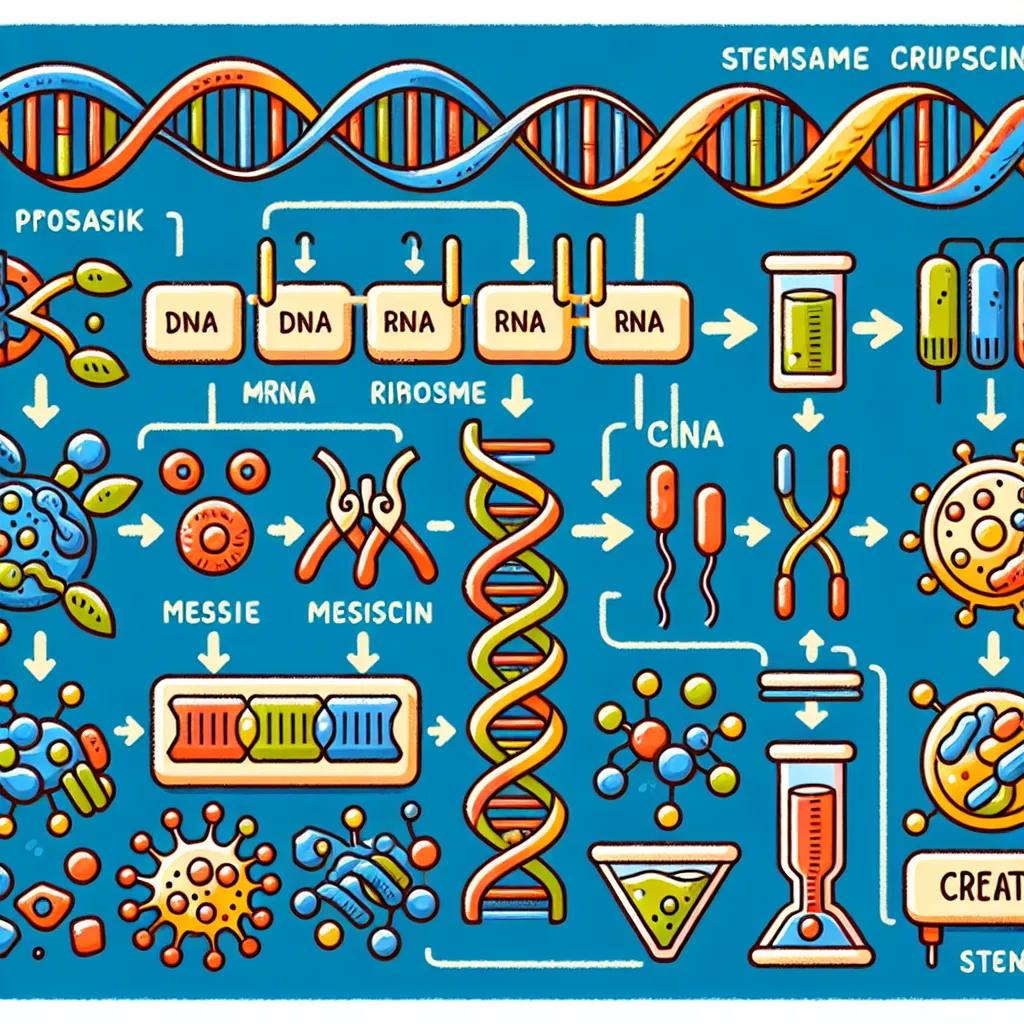Protein synthesis is a crucial biological process that involves the creation of proteins within cells. Let’s break down this essential term:
Definition: The process by which cells create proteins using genetic information.
Part of speech: Noun phrase
Pronunciation: /ˈproʊtiːn ˈsɪnθəsɪs/
Understanding protein synthesis is vital for IELTS candidates, especially those aiming for high scores in the Academic module or pursuing careers in biology-related fields.

Context and Usage of Protein Synthesis
Examples in Context
-
The study of protein synthesis has revolutionized our understanding of cellular biology.
Analysis: This sentence introduces the term in a scientific context, emphasizing its importance in the field of biology. -
Protein synthesis occurs in two main stages: transcription and translation.
Analysis: Here, the term is used to describe the process itself, highlighting its complexity. -
Disruptions in protein synthesis can lead to various genetic disorders.
Analysis: This example demonstrates the clinical relevance of the concept, linking it to medical applications. -
Researchers are developing drugs that target specific steps in protein synthesis to combat certain diseases.
Analysis: This sentence showcases the practical applications of understanding protein synthesis in drug development. -
The rate of protein synthesis in muscle cells increases after intense exercise.
Analysis: This example relates the concept to everyday life and fitness, making it more relatable to a general audience.
Common Contexts
Protein synthesis is frequently discussed in:
- Biology textbooks and research papers
- Medical journals and clinical studies
- Biotechnology and pharmaceutical industries
- Nutrition and sports science literature
Frequency in IELTS
In IELTS, “protein synthesis” may appear in:
- Reading passages in the Academic module (high frequency)
- Listening sections discussing scientific topics (moderate frequency)
- Writing Task 2 essays on scientific advancements or biology (low to moderate frequency)
- Speaking Part 3 questions related to biology or medical progress (low frequency)
Vocabulary Analysis
Word Structure
- Protein: From Greek “proteios” meaning “primary”
- Synthesis: From Greek “syntithenai” meaning “to put together”
Understanding these roots can help remember the meaning: the primary process of putting together proteins.
Synonyms and Related Terms
- Protein production
- Protein biosynthesis
- Gene expression (broader term)
- Translation (specific stage of protein synthesis)
- Transcription (specific stage of protein synthesis)
Antonyms and Contrasting Concepts
- Protein degradation
- Proteolysis
- Catabolism (broader term)
Memorization Techniques
Mind Mapping
Create a mind map with “Protein Synthesis” at the center, branching out to:
- Stages (Transcription, Translation)
- Components (DNA, RNA, Ribosomes, Amino Acids)
- Applications (Medicine, Biotechnology)
- Related Processes (Cell Division, Metabolism)
Storytelling Technique
Imagine a tiny factory (the cell) where workers (enzymes) read blueprints (DNA) to create intricate machines (proteins). The blueprints are first copied (transcription) and then used to assemble the machines piece by piece (translation).
Practice Exercises
Application in IELTS Writing
Task: Write a paragraph explaining the importance of protein synthesis in medical research.
Sample answer:
“Protein synthesis plays a pivotal role in medical research, offering insights into the fundamental processes of life. By understanding how cells create proteins, scientists can develop targeted therapies for genetic disorders and various diseases. For instance, research into protein synthesis has led to breakthroughs in cancer treatment, where drugs can now be designed to inhibit the production of proteins crucial for tumor growth. Moreover, this knowledge has paved the way for personalized medicine, allowing treatments to be tailored to an individual’s genetic makeup. As our grasp of protein synthesis continues to evolve, it promises to revolutionize healthcare, potentially leading to cures for previously intractable conditions.”
IELTS Reading Practice
Question type: Matching headings to paragraphs
Instructions: Match the following headings to the paragraphs in a passage about protein synthesis:
A) The two main stages of protein synthesis
B) Protein synthesis in disease prevention
C) The role of ribosomes in protein synthesis
D) Historical discoveries in protein synthesis research
This exercise mimics the style of IELTS reading questions, challenging your understanding of the topic and your ability to identify main ideas.
Conclusion
Mastering the concept and vocabulary of protein synthesis is crucial for IELTS success, particularly in the Academic module. By understanding its context, analyzing its components, and practicing its usage, you’ll be well-prepared to tackle questions on this topic in various sections of the test.
Remember to use this term precisely and confidently in your responses. Practice incorporating it into your writing and speaking to demonstrate a high level of scientific literacy. Don’t hesitate to share your experiences or ask questions about using this term in the comments below!